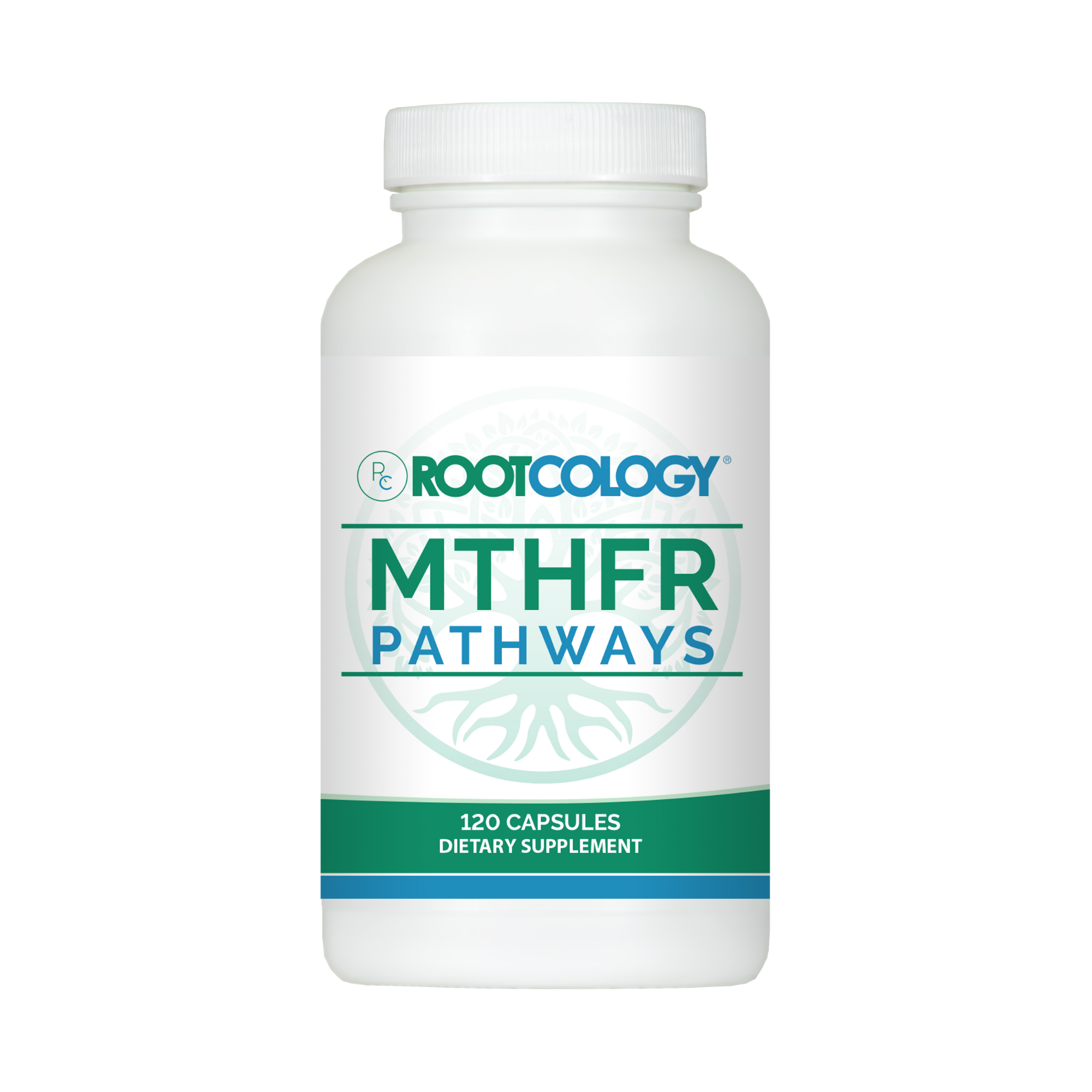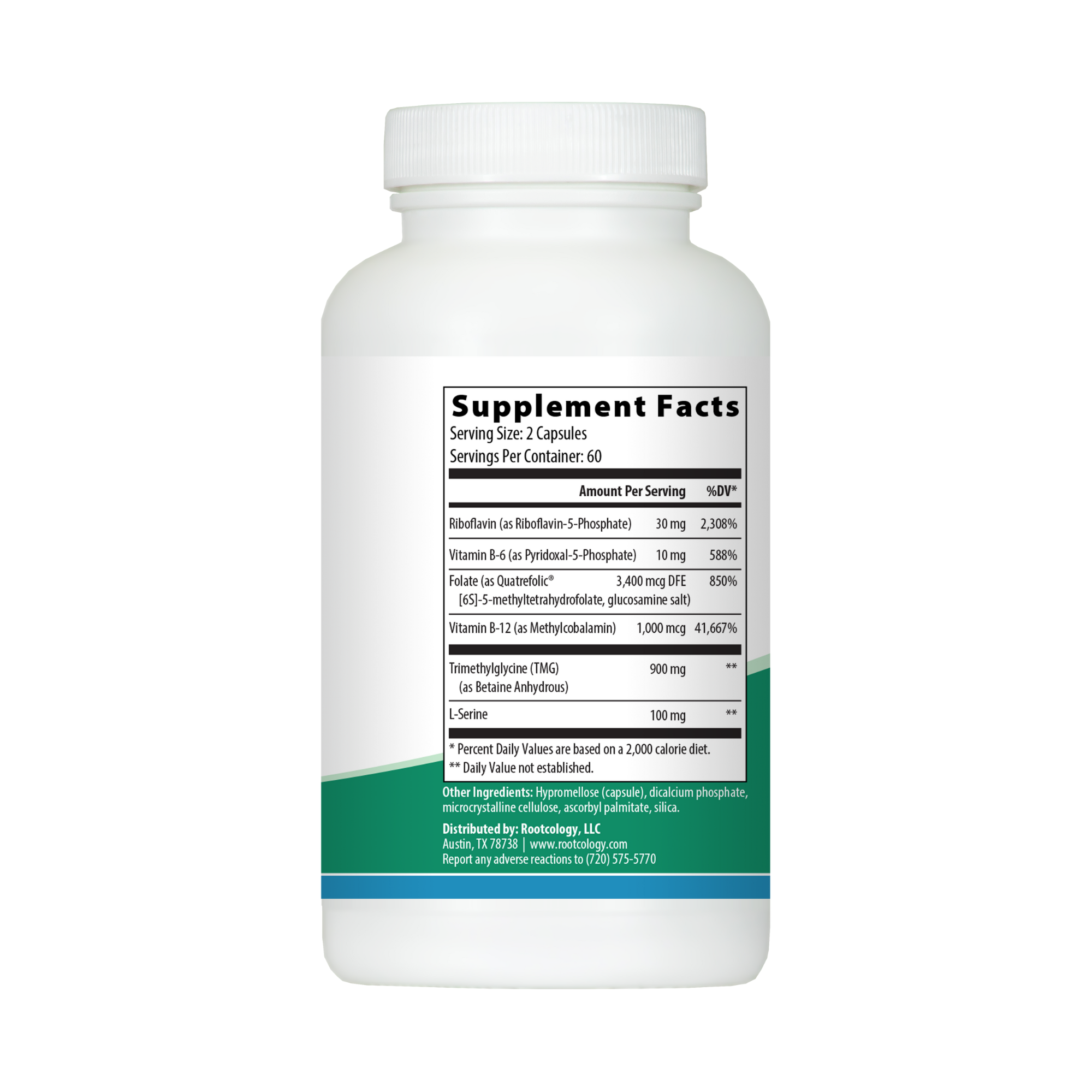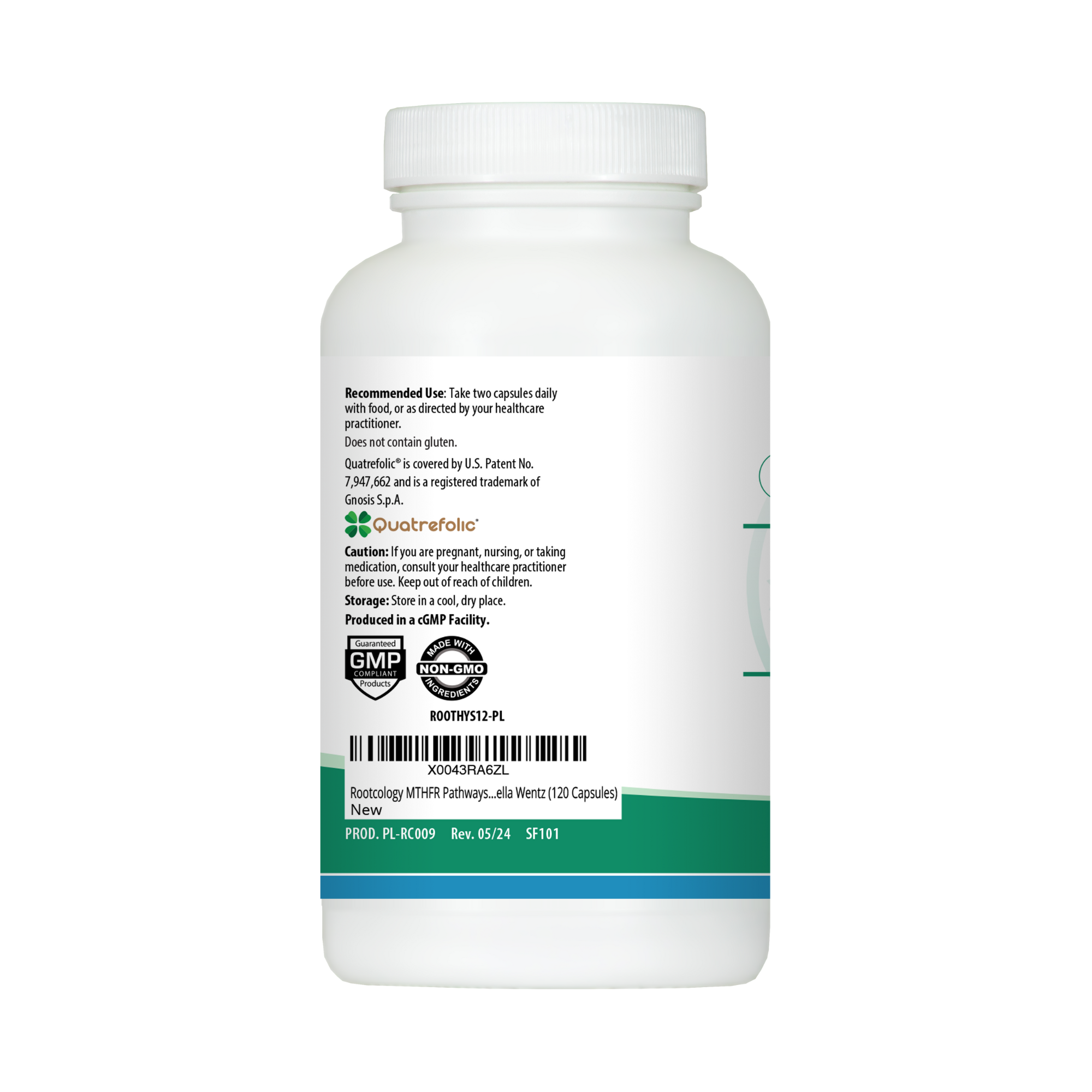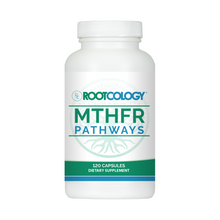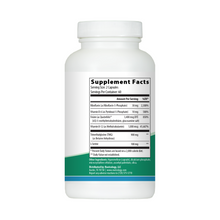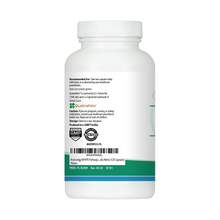What is MTHFR Pathways?
MTHFR Pathways contains important nutrients that work together to support the metabolism of homocysteine and help maintain healthy homocysteine levels. Homocysteine is transformed into important end products such as taurine, cysteine, norepinephrine, and dopamine.*
What are the benefits of MTHFR Pathways?
MTHFR Pathways provides key nutrients for maintaining proper homocysteine metabolism and the production of the very important antioxidant glutathione. It can also help support numerous aspects of health including normal detoxification, immune health, joint and cartilage health, cardiovascular health, and brain health.*
What is the recommended dose?
Two capsules, once per day, is recommended.
When should I take it?
MTHFR Pathways should be taken with meals (preferably earlier in the day, as it can cause stimulation due to the B vitamins).
How long can I take MTHFR Pathways for?
MTHFR Pathways can be taken for 1-2 weeks during a liver support protocol, or long term for those who have a MTHFR gene variation.
Can it be taken with thyroid medications?
MTHFR Pathways should be taken at least 60 minutes away from thyroid medications. Testing your thyroid hormone levels every 30-90 days to see if a medication adjustment is needed, is recommended.
Does the dicalcium phosphate in the MTHFR Pathways product mean that it should be separated from thyroid medication by at least 4 hours?
For T4 medications, the interaction between calcium and levothyroxine has been found to be dose-dependent, and the amount in MTHFR Pathways should not impact absorption. Generally, spacing by 1 hour from thyroid medication, or as directed by your pharmacist or practitioner, should be appropriate. However, if you notice any signs that it might be affecting your thyroid hormone levels, or would like to take extra precautions, you can definitely space it out by 2 to 4 hours from the thyroid medication. (Note: Those taking Tirosint are less likely to experience absorption issues, due to the Tirosint formulation.)*
Can I take MTHFR Pathways even if I don’t have a MTHFR gene mutation?
Yes.
What if I feel worse after taking the MTHFR Pathways supplement?
While most people with Hashimoto’s tend to feel better, about 8 percent of people will feel worse with MTHFR Pathways. Some of the people who feel slightly worse (i.e. those who may experience more anxiety and irritability) may benefit from a dosage reduction, in the case that their pathways are moving too quickly. However, if “feeling worse” lasts more than a few days, this could be due to overmethylation, other gene variations, or a sensitivity to the supplements, and the supplements should be discontinued and discussed with your practitioner.
Not to be used by those with a sulfur sensitivity. Do not use if you are allergic or sensitive to any of the ingredients in this supplement.
Consult with a doctor before use if you have a corn allergy, or are pregnant or breastfeeding.
DO NOT TAKE if taking the following medications: 5-fluorouracil, ACE inhibitors, activated charcoal, aminoglycoside antibiotics, amiodarone, antacids, anticoagulants/antiplatelet drugs, antidiabetic drugs, antihypertensive drugs, atazanavir, bisphosphonates, blood thinners, calcium channel blockers, capecitabine, cephalexin, chloroquine, cisplatin, digoxin, fosphenytoin, integrase inhibitors, levodopa/carbidopa, methotrexate, nitroglycerin, phenobarbital, penicillamine, phenytoin, potassium-sparing diuretics, primidone, pyrimethamine, quinolone antibiotics, ritonavir, skeletal muscle relaxants, sulfonylureas, and/or tetracycline antibiotics.
Please note: MTHFR Pathways uses an ingredient derived from non-GMO corn, but does not contain corn in the finished product. While it is generally well-tolerated by those with corn sensitivities, please consult with your practitioner before use if you have a corn allergy or other individual concerns.
- Dell’edera D, Tinelli A, Milazzo G, et al. Effect of multivitamins on plasma homocysteine in patients with the 5,10 methylenetetrahydrofolate reductase C677T homozygous state. Molecular Medicine Reports. 2013;8(2): 609-612. doi:10.3892/mmr.2013.1563.
- McNulty H, Pentieva K, Hoey L, Strain J, Ward M. Nutrition throughout life: folate. International journal for vitamin and nutrition research. 2012;82(5):348-354. doi: 10.1024/0300-9831/a000130.
- Zappacosta B, Mastroiacovo P, Persichilli S, et. al. Homocysteine lowering by folate-rich diet or pharmacological supplementations in subjects with moderate hyperhomocysteinemia. Nutrients. 2013;5(5):1531-1543. doi:10.3390/nu5051531.
- Prinz-Langenohl R, Brämswig S, Tobolski O, et al. [6S]-5-methyltetrahydrofolate increases plasma folate more effectively than folic acid in women with the homozygous or wildtype 677C→T polymorphism of methylenetetrahydrofolate reductase. British Journal of Pharmacology. 2009;158(8):2014–2021. doi: 10.1111/j.1476-5381.2009.00492.x.
- Dietary Supplement Fact Sheet: Folate. National Institutes of Health. http://ods.od.nih.gov/factsheets/Folate-HealthProfessional/. Updated April 20, 2016. Accessed January 2, 2018.
- Dietary Supplement Fact Sheet: Vitamin B6. National Institutes of Health. http://ods.od.nih.gov/factsheets/VitaminB6-HealthProfessional/. Updated February 11, 2016. Accessed January 2, 2018.
- Walsh N. Folic acid cancer debate continues. MedPage Today. 2013. http://www.medpagetoday.com/HematologyOncology/ColonCancer/37008. Accessed June 3, 2013.
- Lynch B. What is MTHR?. MTHFR.net. http://mthfr.net. Accessed June 3, 2013.
- Arakawa Y, Watanabe M, Inoue N, et al. Association of polymorphisms in DNMT1, DNMT3A, DNMT3B, MTHFR and MTRR genes with global DNA methylation levels and prognosis of autoimmune thyroid disease. Clinical and Experimental Immunology. 2012;170(2):194–201. doi:10.1111/j.1365-2249.2012.04646.
- Nagele P, Zeugswetter B, Wiener C, et al. Influence of Methylenetetrahydrofolate Reductase Gene Polymorphisms on Homocysteine Concentrations after Nitrous Oxide Anesthesia. Anesthesiology. 2008;109:36-43. doi:10.1097/ALN.0b013e318178820
- Pollak A, Mueller-Malesinska M, Lechowicz U, et al. MTHFR 677T is a strong determinant of the degree of hearing loss among Polish males with postlingual sensorineural hearing impairment. DNA Cell Biol. 2012;31(7):1267-1273. doi: 10.1089/dna.2012.1607.
- Lynch B. Dirty Genes: A Breakthrough Program to Treat the Root Cause of Illness and Optimize Your Health. New York, Harper One: 2018.
- Elhomsy G. Homocysteine: Reference Ranges. Medscape. https://emedicine.medscape.com/article/2085682-overview. Published January 18, 2013. Updated November 21, 2014. Accessed January 31, 2018.
- Pizzorno J. Homocysteine: Friend or Foe? Integrative Medicine: A Clinician’s Journal. 2014;13(4):8-14.
- Natural Medicines Therapeutic Research Collaboration. https://naturalmedicines.therapeuticresearch.com/. Accessed August 5, 2020.
You May Also Like
Questions about Rootcology Products? Email info@rootcology.com and we will get back to you within 24 business hours.




